- Home
- Joseph Conrad
Notes on Life & Letters Page 7
Notes on Life & Letters Read online
Page 7
Much good paper has been lamentably wasted to prove that science has destroyed, that it is destroying, or, some day, may destroy poetry. Meantime, unblushing, unseen, and often unheard, the guileless poets have gone on singing in a sweet strain. How they dare do the impossible and virtually forbidden thing is a cause for wonder but not for legislation. Not yet. We are at present too busy reforming the silent burglar and planning concerts to soothe the savage breast of the yelling hooligan. As somebody--perhaps a publisher--said lately: "Poetry is of no account now-a-days."
But it is not totally neglected. Those persons with gold-rimmed spectacles whose usual occupation is to spy upon the obvious have remarked audibly (on several occasions) that poetry has so far not given to science any acknowledgment worthy of its distinguished position in the popular mind. Except that Tennyson looked down the throat of a foxglove, that Erasmus Darwin wrote THE LOVES OF THE PLANTS and a scoffer THE LOVES OF THE TRIANGLES, poets have been supposed to be indecorously blind to the progress of science. What tribute, for instance, has poetry paid to electricity? All I can remember on the spur of the moment is Mr. Arthur Symons' line about arc lamps: "Hung with the globes of some unnatural fruit."
Commerce and Manufacture praise on every hand in their not mute but inarticulate way the glories of science. Poetry does not play its part. Behold John Keats, skilful with the surgeon's knife; but when he writes poetry his inspiration is not from the operating table. Here I am reminded, though, of a modern instance to the contrary in prose. Mr. H. G. Wells, who, as far as I know, has never written a line of verse, was inspired a few years ago to write a short story, UNDER THE KNIFE. Out of a clock-dial, a brass rod, and a whiff of chloroform, he has conjured for us a sensation of space and eternity, evoked the face of the Unknowable, and an awesome, august voice, like the voice of the Judgment Day; a great voice, perhaps the voice of science itself, uttering the words: "There shall be no more pain!" I advise you to look up that story, so human and so intimate, because Mr. Wells, the writer of prose whose amazing inventiveness we all know, remains a poet even in his most perverse moments of scorn for things as they are. His poetic imagination is sometimes even greater than his inventiveness, I am not afraid to say. But, indeed, imaginative faculty would make any man a poet--were he born without tongue for speech and without hands to seize his fancy and fasten her down to a wretched piece of paper.
The book {6} which in the course of the last few days I have opened and shut several times is not imaginative. But, on the other hand, it is not a dumb book, as some are. It has even a sort of sober and serious eloquence, reminding us that not poetry alone is at fault in this matter. Mr. Bourne begins his ASCENDING EFFORT with a remark by Sir Francis Galton upon Eugenics that "if the principles he was advocating were to become effective they must be introduced into the national conscience, like a new religion." "Introduced" suggests compulsory vaccination. Mr. Bourne, who is not a theologian, wishes to league together not science and religion, but science and the arts. "The intoxicating power of art," he thinks, is the very thing needed to give the desired effect to the doctrines of science. In uninspired phrase he points to the arts playing once upon a time a part in "popularising the Christian tenets." With painstaking fervour as great as the fervour of prophets, but not so persuasive, he foresees the arts some day popularising science. Until that day dawns, science will continue to be lame and poetry blind. He himself cannot smooth or even point out the way, though he thinks that "a really prudent people would be greedy of beauty," and their public authorities "as careful of the sense of comfort as of sanitation."
As the writer of those remarkable rustic notebooks, THE BETTESWORTH BOOK and MEMOIRS OF A SURREY LABOURER, the author has a claim upon our attention. But his seriousness, his patience, his almost touching sincerity, can only command the respect of his readers and nothing more. He is obsessed by science, haunted and shadowed by it, until he has been bewildered into awe. He knows, indeed, that art owes its triumphs and its subtle influence to the fact that it issues straight from our organic vitality, and is a movement of life-cells with their matchless unintellectual knowledge. But the fact that poetry does not seem obviously in love with science has never made him doubt whether it may not be an argument against his haste to see the marriage ceremony performed amid public rejoicings.
Many a man has heard or read and believes that the earth goes round the sun; one small blob of mud among several others, spinning ridiculously with a waggling motion like a top about to fall. This is the Copernican system, and the man believes in the system without often knowing as much about it as its name. But while watching a sunset he sheds his belief; he sees the sun as a small and useful object, the servant of his needs and the witness of his ascending effort, sinking slowly behind a range of mountains, and then he holds the system of Ptolemy. He holds it without knowing it. In the same way a poet hears, reads, and believes a thousand undeniable truths which have not yet got into his blood, nor will do after reading Mr. Bourne's book; he writes, therefore, as if neither truths nor book existed. Life and the arts follow dark courses, and will not turn aside to the brilliant arc-lights of science. Some day, without a doubt,--and it may be a consolation to Mr. Bourne to know it--fully informed critics will point out that Mr. Davies's poem on a dark woman combing her hair must have been written after the invasion of appendicitis, and that Mr. Yeats's "Had I the heaven's embroidered cloths" came before radium was quite unnecessarily dragged out of its respectable obscurity in pitchblende to upset the venerable (and comparatively naive) chemistry of our young days.
There are times when the tyranny of science and the cant of science are alarming, but there are other times when they are entertaining- -and this is one of them. "Many a man prides himself" says Mr. Bourne, "on his piety or his views of art, whose whole range of ideas, could they be investigated, would be found ordinary, if not base, because they have been adopted in compliance with some external persuasion or to serve some timid purpose instead of proceeding authoritatively from the living selection of his hereditary taste." This extract is a fair sample of the book's thought and of its style. But Mr. Bourne seems to forget that "persuasion" is a vain thing. The appreciation of great art comes from within.
It is but the merest justice to say that the transparent honesty of Mr. Bourne's purpose is undeniable. But the whole book is simply an earnest expression of a pious wish; and, like the generality of pious wishes, this one seems of little dynamic value--besides being impracticable.
Yes, indeed. Art has served Religion; artists have found the most exalted inspiration in Christianity; but the light of Transfiguration which has illuminated the profoundest mysteries of our sinful souls is not the light of the generating stations, which exposes the depths of our infatuation where our mere cleverness is permitted for a while to grope for the unessential among invincible shadows.
THE CENSOR OF PLAYS—AN APPRECIATION--1907
A couple of years ago I was moved to write a one-act play--and I lived long enough to accomplish the task. We live and learn. When the play was finished I was informed that it had to be licensed for performance. Thus I learned of the existence of the Censor of Plays. I may say without vanity that I am intelligent enough to have been astonished by that piece of information: for facts must stand in some relation to time and space, and I was aware of being in England--in the twentieth-century England. The fact did not fit the date and the place. That was my first thought. It was, in short, an improper fact. I beg you to believe that I am writing in all seriousness and am weighing my words scrupulously.
Therefore I don't say inappropriate. I say improper--that is: something to be ashamed of. And at first this impression was confirmed by the obscurity in which the figure embodying this after all considerable fact had its being. The Censor of Plays! His name was not in the mouths of all men. Far from it. He seemed stealthy and remote. There was about that figure the scent of the far East, like the peculiar atmosphere of a Mandarin's back yard, and the mustiness of the Middle Ages
, that epoch when mankind tried to stand still in a monstrous illusion of final certitude attained in morals, intellect and conscience.
It was a disagreeable impression. But I reflected that probably the censorship of plays was an inactive monstrosity; not exactly a survival, since it seemed obviously at variance with the genius of the people, but an heirloom of past ages, a bizarre and imported curiosity preserved because of that weakness one has for one's old possessions apart from any intrinsic value; one more object of exotic VIRTU, an Oriental POTICHE, a MAGOT CHINOIS conceived by a childish and extravagant imagination, but allowed to stand in stolid impotence in the twilight of the upper shelf.
Thus I quieted my uneasy mind. Its uneasiness had nothing to do with the fate of my one-act play. The play was duly produced, and an exceptionally intelligent audience stared it coldly off the boards. It ceased to exist. It was a fair and open execution. But having survived the freezing atmosphere of that auditorium I continued to exist, labouring under no sense of wrong. I was not pleased, but I was content. I was content to accept the verdict of a free and independent public, judging after its conscience the work of its free, independent and conscientious servant--the artist.
Only thus can the dignity of artistic servitude be preserved--not to speak of the bare existence of the artist and the self-respect of the man. I shall say nothing of the self-respect of the public. To the self-respect of the public the present appeal against the censorship is being made and I join in it with all my heart.
For I have lived long enough to learn that the monstrous and outlandish figure, the MAGOT CHINOIS whom I believed to be but a memorial of our forefathers' mental aberration, that grotesque POTICHE, works! The absurd and hollow creature of clay seems to be alive with a sort of (surely) unconscious life worthy of its traditions. It heaves its stomach, it rolls its eyes, it brandishes a monstrous arm: and with the censorship, like a Bravo of old Venice with a more carnal weapon, stabs its victim from behind in the twilight of its upper shelf. Less picturesque than the Venetian in cloak and mask, less estimable, too, in this, that the assassin plied his moral trade at his own risk deriving no countenance from the powers of the Republic, it stands more malevolent, inasmuch that the Bravo striking in the dusk killed but the body, whereas the grotesque thing nodding its mandarin head may in its absurd unconsciousness strike down at any time the spirit of an honest, of an artistic, perhaps of a sublime creation.
This Chinese monstrosity, disguised in the trousers of the Western Barbarian and provided by the State with the immortal Mr. Stiggins's plug hat and umbrella, is with us. It is an office. An office of trust. And from time to time there is found an official to fill it. He is a public man. The least prominent of public men, the most unobtrusive, the most obscure if not the most modest.
But however obscure, a public man may be told the truth if only once in his life. His office flourishes in the shade; not in the rustic shade beloved of the violet but in the muddled twilight of mind, where tyranny of every sort flourishes. Its holder need not have either brain or heart, no sight, no taste, no imagination, not even bowels of compassion. He needs not these things. He has power. He can kill thought, and incidentally truth, and incidentally beauty, providing they seek to live in a dramatic form. He can do it, without seeing, without understanding, without feeling anything; out of mere stupid suspicion, as an irresponsible Roman Caesar could kill a senator. He can do that and there is no one to say him nay. He may call his cook (Moliere used to do that) from below and give her five acts to judge every morning as a matter of constant practice and still remain the unquestioned destroyer of men's honest work. He may have a glass too much. This accident has happened to persons of unimpeachable morality--to gentlemen. He may suffer from spells of imbecility like Clodius. He may . . . what might he not do! I tell you he is the Caesar of the dramatic world. There has been since the Roman Principate nothing in the way of irresponsible power to compare with the office of the Censor of Plays.
Looked at in this way it has some grandeur, something colossal in the odious and the absurd. This figure in whose power it is to suppress an intellectual conception--to kill thought (a dream for a mad brain, my masters!)--seems designed in a spirit of bitter comedy to bring out the greatness of a Philistine's conceit and his moral cowardice.
But this is England in the twentieth century, and one wonders that there can be found a man courageous enough to occupy the post. It is a matter for meditation. Having given it a few minutes I come to the conclusion in the serenity of my heart and the peace of my conscience that he must be either an extreme megalomaniac or an utterly unconscious being.
He must be unconscious. It is one of the qualifications for his magistracy. Other qualifications are equally easy. He must have done nothing, expressed nothing, imagined nothing. He must be obscure, insignificant and mediocre--in thought, act, speech and sympathy. He must know nothing of art, of life--and of himself. For if he did he would not dare to be what he is. Like that much questioned and mysterious bird, the phoenix, he sits amongst the cold ashes of his predecessor upon the altar of morality, alone of his kind in the sight of wondering generations.
And I will end with a quotation reproducing not perhaps the exact words but the true spirit of a lofty conscience.
"Often when sitting down to write the notice of a play, especially when I felt it antagonistic to my canons of art, to my tastes or my convictions, I hesitated in the fear lest my conscientious blame might check the development of a great talent, my sincere judgment condemn a worthy mind. With the pen poised in my hand I hesitated, whispering to myself 'What if I were perchance doing my part in killing a masterpiece.'"
Such were the lofty scruples of M. Jules Lemaitre--dramatist and dramatic critic, a great citizen and a high magistrate in the Republic of Letters; a Censor of Plays exercising his august office openly in the light of day, with the authority of a European reputation. But then M. Jules Lemaitre is a man possessed of wisdom, of great fame, of a fine conscience--not an obscure hollow Chinese monstrosity ornamented with Mr. Stiggins's plug hat and cotton umbrella by its anxious grandmother--the State.
Frankly, is it not time to knock the improper object off its shelf? It has stood too long there. Hatched in Pekin (I should say) by some Board of Respectable Rites, the little caravan monster has come to us by way of Moscow--I suppose. It is outlandish. It is not venerable. It does not belong here. Is it not time to knock it off its dark shelf with some implement appropriate to its worth and status? With an old broom handle for instance.
PART II--LIFE
AUTOCRACY AND WAR--1905
From the firing of the first shot on the banks of the Sha-ho, the fate of the great battle of the Russo-Japanese war hung in the balance for more than a fortnight. The famous three-day battles, for which history has reserved the recognition of special pages, sink into insignificance before the struggles in Manchuria engaging half a million men on fronts of sixty miles, struggles lasting for weeks, flaming up fiercely and dying away from sheer exhaustion, to flame up again in desperate persistence, and end--as we have seen them end more than once--not from the victor obtaining a crushing advantage, but through the mortal weariness of the combatants.
We have seen these things, though we have seen them only in the cold, silent, colourless print of books and newspapers. In stigmatising the printed word as cold, silent and colourless, I have no intention of putting a slight upon the fidelity and the talents of men who have provided us with words to read about the battles in Manchuria. I only wished to suggest that in the nature of things, the war in the Far East has been made known to us, so far, in a grey reflection of its terrible and monotonous phases of pain, death, sickness; a reflection seen in the perspective of thousands of miles, in the dim atmosphere of official reticence, through the veil of inadequate words. Inadequate, I say, because what had to be reproduced is beyond the common experience of war, and our imagination, luckily for our peace of mind, has remained a slumbering faculty, notwithstanding the din of human
itarian talk and the real progress of humanitarian ideas. Direct vision of the fact, or the stimulus of a great art, can alone make it turn and open its eyes heavy with blessed sleep; and even there, as against the testimony of the senses and the stirring up of emotion, that saving callousness which reconciles us to the conditions of our existence, will assert itself under the guise of assent to fatal necessity, or in the enthusiasm of a purely aesthetic admiration of the rendering. In this age of knowledge our sympathetic imagination, to which alone we can look for the ultimate triumph of concord and justice, remains strangely impervious to information, however correctly and even picturesquely conveyed. As to the vaunted eloquence of a serried array of figures, it has all the futility of precision without force. It is the exploded superstition of enthusiastic statisticians. An over-worked horse falling in front of our windows, a man writhing under a cart-wheel in the streets awaken more genuine emotion, more horror, pity, and indignation than the stream of reports, appalling in their monotony, of tens of thousands of decaying bodies tainting the air of the Manchurian plains, of other tens of thousands of maimed bodies groaning in ditches, crawling on the frozen ground, filling the field hospitals; of the hundreds of thousands of survivors no less pathetic and even more tragic in being left alive by fate to the wretched exhaustion of their pitiful toil.
An early Victorian, or perhaps a pre-Victorian, sentimentalist, looking out of an upstairs window, I believe, at a street--perhaps Fleet Street itself--full of people, is reported, by an admiring friend, to have wept for joy at seeing so much life. These arcadian tears, this facile emotion worthy of the golden age, comes to us from the past, with solemn approval, after the close of the Napoleonic wars and before the series of sanguinary surprises held in reserve by the nineteenth century for our hopeful grandfathers. We may well envy them their optimism of which this anecdote of an amiable wit and sentimentalist presents an extreme instance, but still, a true instance, and worthy of regard in the spontaneous testimony to that trust in the life of the earth, triumphant at last in the felicity of her children. Moreover, the psychology of individuals, even in the most extreme instances, reflects the general effect of the fears and hopes of its time. Wept for joy! I should think that now, after eighty years, the emotion would be of a sterner sort. One could not imagine anybody shedding tears of joy at the sight of much life in a street, unless, perhaps, he were an enthusiastic officer of a general staff or a popular politician, with a career yet to make. And hardly even that. In the case of the first tears would be unprofessional, and a stern repression of all signs of joy at the provision of so much food for powder more in accord with the rules of prudence; the joy of the second would be checked before it found issue in weeping by anxious doubts as to the soundness of these electors' views upon the question of the hour, and the fear of missing the consensus of their votes.

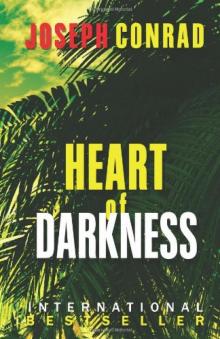 Heart of Darkness
Heart of Darkness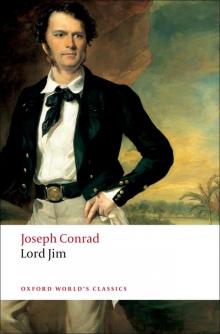 Lord Jim
Lord Jim The Nigger of the Narcissus (Echo Library)
The Nigger of the Narcissus (Echo Library) Victory (Dover Thrift Editions)
Victory (Dover Thrift Editions) Secret Agent
Secret Agent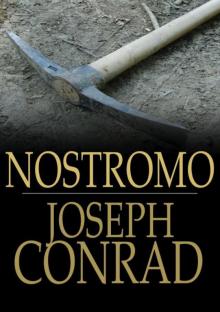 Nostromo
Nostromo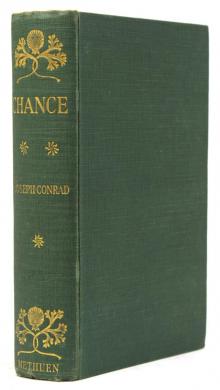 Chance: A Tale in Two Parts
Chance: A Tale in Two Parts Youth
Youth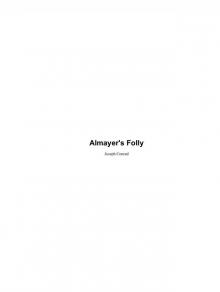 Almayer's Folly
Almayer's Folly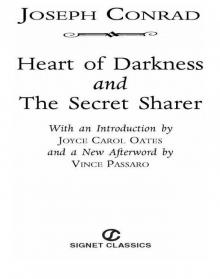 The Heart of Darkness and the Secret Sharer
The Heart of Darkness and the Secret Sharer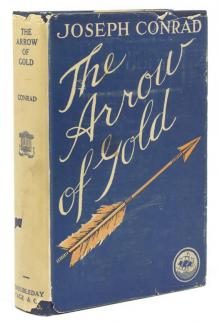 The Arrow of Gold: A Story Between Two Notes
The Arrow of Gold: A Story Between Two Notes The Rescue: A Romance of the Shallows
The Rescue: A Romance of the Shallows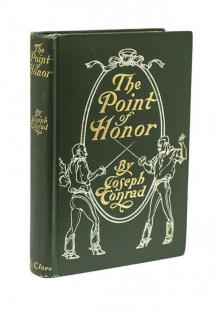 The Point Of Honor: A Military Tale
The Point Of Honor: A Military Tale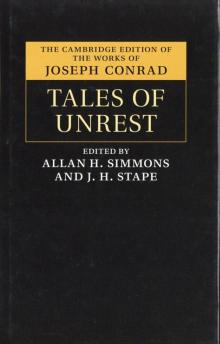 Tales of Unrest
Tales of Unrest Under Western Eyes
Under Western Eyes Gaspar Ruiz
Gaspar Ruiz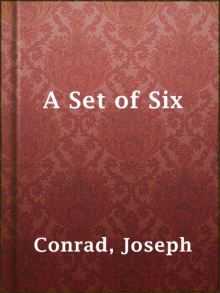 A Set of Six
A Set of Six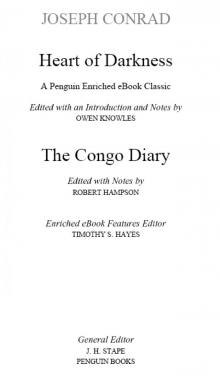 Heart of Darkness and the Congo Diary (Penguin Classics)
Heart of Darkness and the Congo Diary (Penguin Classics)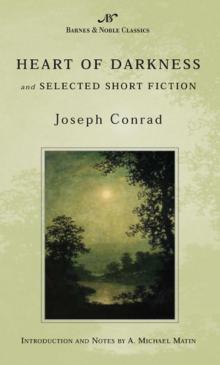 Heart of Darkness and Selected Short Fiction
Heart of Darkness and Selected Short Fiction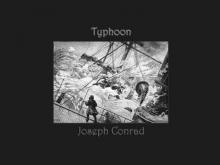 Typhoon
Typhoon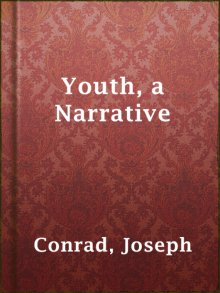 Youth, a Narrative
Youth, a Narrative Tomorrow
Tomorrow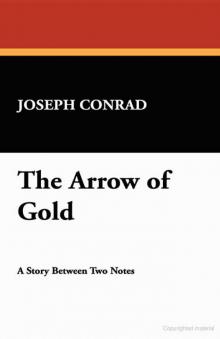 The Arrow of Gold
The Arrow of Gold The Shadow Line: A Confession
The Shadow Line: A Confession The Rescue
The Rescue Victory (Echo Library)
Victory (Echo Library) The Brute
The Brute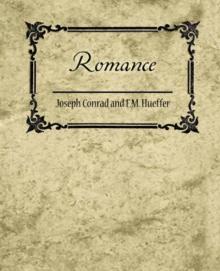 Romance
Romance A Personal Record
A Personal Record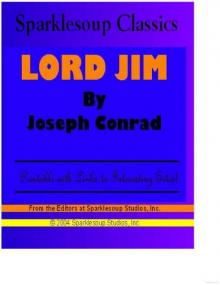 Lord Jim: A Tale
Lord Jim: A Tale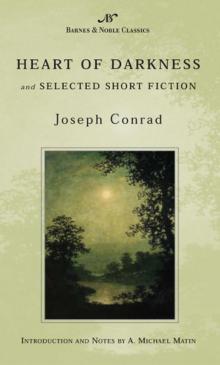 Heart of Darkness and Selected Short Fiction (Barnes & Noble Classics Series)
Heart of Darkness and Selected Short Fiction (Barnes & Noble Classics Series) Within the Tides
Within the Tides The Secret Sharer and Other Stories
The Secret Sharer and Other Stories Falk
Falk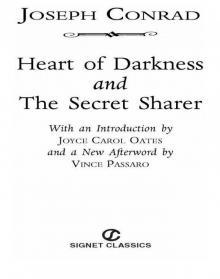 Heart of Darkness and The Secret Sharer
Heart of Darkness and The Secret Sharer Chance
Chance An Anarchist
An Anarchist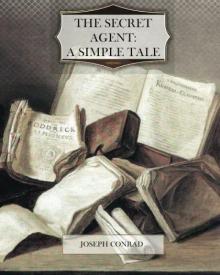 The Secret Agent: A Simple Tale
The Secret Agent: A Simple Tale The Secret Agent
The Secret Agent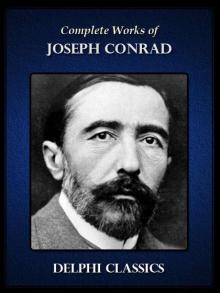 Complete Works of Joseph Conrad (Illustrated)
Complete Works of Joseph Conrad (Illustrated)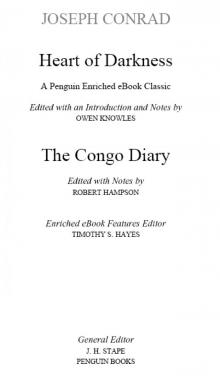 Heart of Darkness and the Congo Diary
Heart of Darkness and the Congo Diary Notes on Life & Letters
Notes on Life & Letters Typhoon (Single Story)
Typhoon (Single Story)